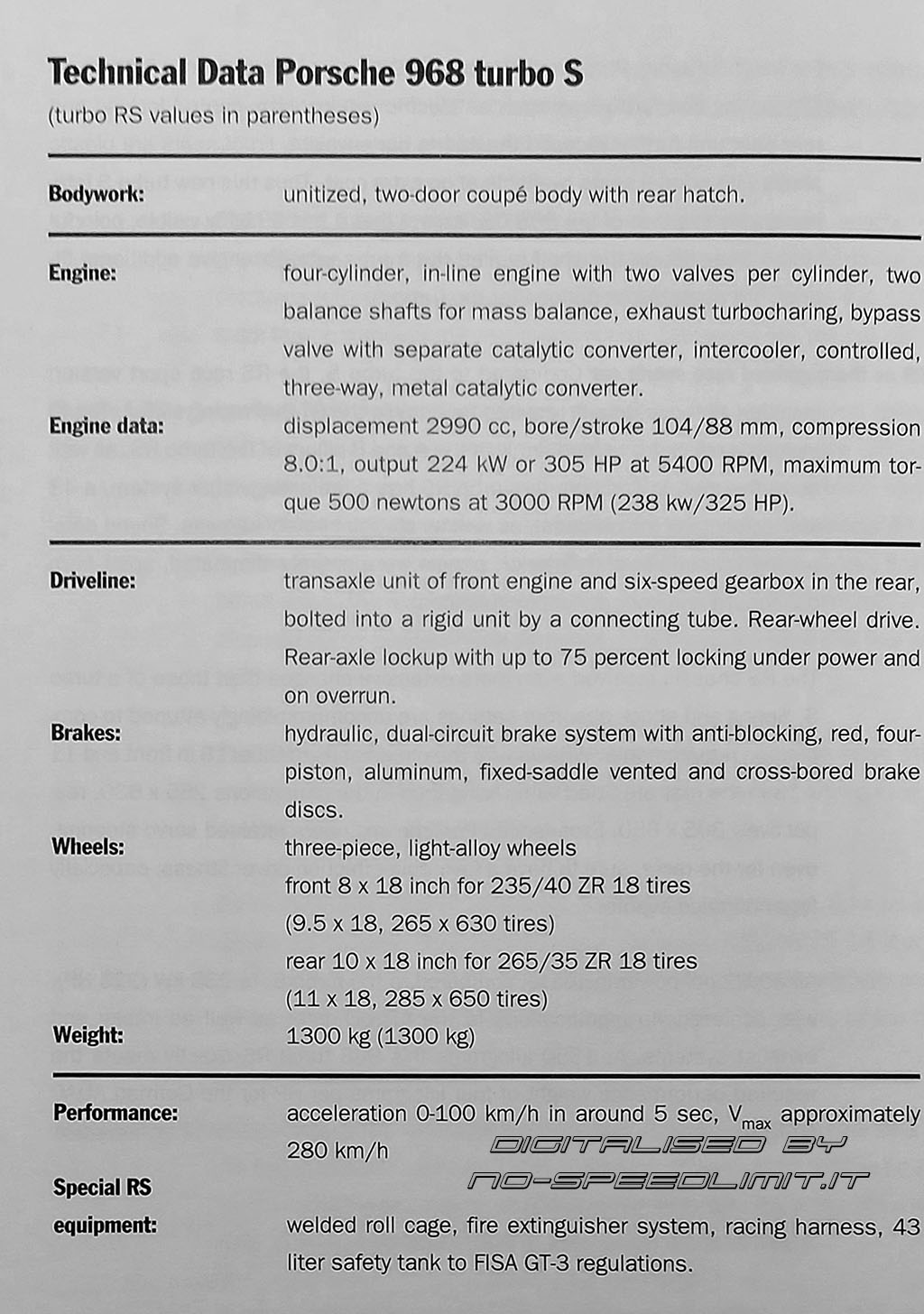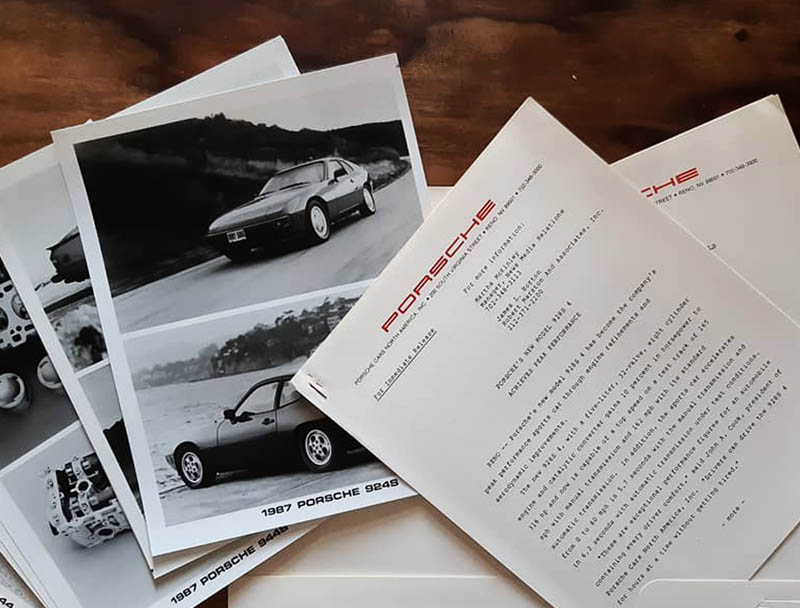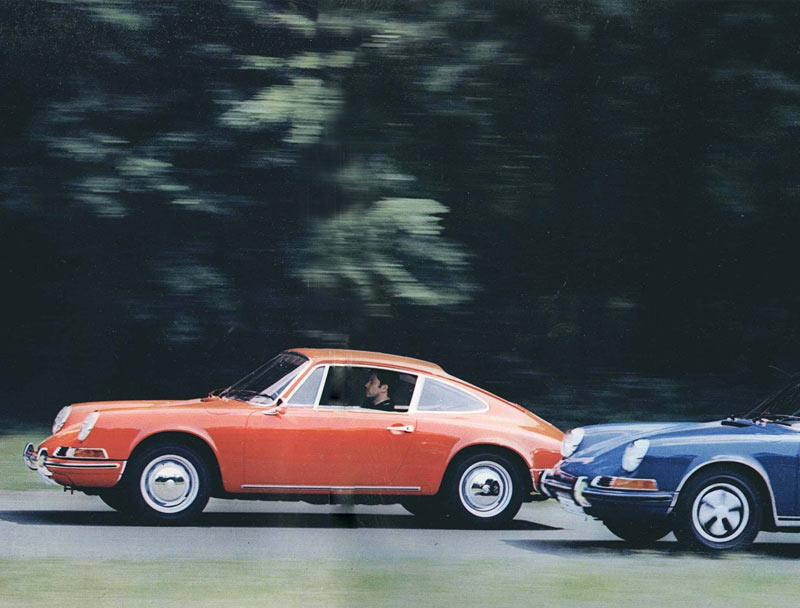.jpg)
The 944 Turbo Racing History
With its 968 turbo S and turbo RS models the Dr.Ing.h.c F. Porsche AG offers wo versions of the successful four-cylinder sports car with clearly increased berformance. Originally developed for a new motor racing serles, Germany's ADAC GT Cup, under the name of 968 turbo RS, there is also a small number of a road version called 968 turbo S for engaged sporting drivers.
Only a total of some 50 to 100 cars will be built of the 968 turbo S with 224 kW (305 HP) and turbo RS with race sport equipment and 238 kW (325 HP). Unlike production models, these will be built by the race sport division of the Porsche AG at the Weissach Development Center.
.jpg)
The 3.0 liter engine of the Porsche 968 holds a leading position among unblown four-cylinder engines. No other four reaches the output value of 176 kW (240 HP) posted by a 968. The Porsche race sport department has developed a turbo variation on this basis which produces 224 kW (305 HP), under the name of 968 turbo S.
Whereas the basic, normal-induction version of this engine uses four valves in each cylinder, Porsche prefers the two-valve concept for its turbo S. The exhaust turbocharger, built by KKK, is water-cooled and fitted with a bypass valve equipped with an additional catalytic converter for optimum exhaust scrubbing. Boost pressure regulation is handled by time valve, maximum boost pressure lies around 1 bar. An intercooler ensures additional output potential.
This turbo engine produces the enormous torque of 500 newtons, an excep tional value for engines of this displacement class. The torque peak is already available at 3000 RPM, maximum output at 5400 RPM.
The standard six-speed gearbox of the 968 provides an outstanding starting point for power transmission. It could remain largely unchanged. Only the crown wheel and pinion have longer ratios, while fifth and sixth gears are also longer.
A limited-slip differential for the rear axle permits equal lockup effect under power or on overrun, with maximum lockup of 75 percent in both cases. The clutch was adapted to higher engine output.
At 1300 kg (empty welght with full tank) the sporting version weighs 70 kilograms less than a basic 968. In conjunction with increased engine output, this produces impressive performance. The 968 turbo S reaches the 100 km/h mark from a standstill in some five seconds. Top speed lies around 280 km/h.
The chassis of the 968 underwent several changes so that the turbo S would meet demands of higher performance without compromise. The body is lowered by twenty millimeters and given firmer spring and shock absorber adjustment. Front brakes are taken from the special 911 turbo S, meaning four-piston, aluminum, fixed saddle brakes with vented and cross-bored discs. The rear brake system is built with the same technology and thus also laid out to meet extreme demands. Brake saddles front and rear are coated in red.
The turbo S is fitted with an anti-block brake system. Precise servo steering even for this sporting version, provides safe and low-fatigue driving in all speed realms and for all road conditions.
Rims, familiar from the Carrera Cup, are a three-piece design, 8 J x 18 in front, 10 J x 18 in back. They mount tires in the sizes 235/40 ZR 18 (front) and 265/35 ZR 18 (rear). With these, adhesion and cornering stability could be clearly increased, even above the already outstanding values of the production car.
Optically this turbo S differs from the 968 chiefly for two additional openings in the engine lid. These permit increased air flow to the turbocharged engine. In addition, the front opening in the nose is enlarged, to ensure optimum cooling, even under extreme loads.
A new plastic lip is conspicuous on the lower edge of the nose. This stemmed from extensive tests in the wind tunnel and blends harmoniously into the spoiler. Together with a new rear spoiler, adjustable through ten degrees, this provides a clear improvement in the car's negative lift.
For weight reasons Porsche eliminated PVC coating from the turbo S floorpan. Eliminating comfort extras such as electric window lifts, central locking and rear seat unit further reduced the sports car's weight. Front seats are plastic shells with normal seats available at no extra cost. Thus this new turbo S interior is very like that of the 968 CS, except that it has a highly visible, colorful "turbo S" script on the shelf behind the front seats, Extensive additional fittings are available as options for the turbo S.
Compared to the turbo S, the RS race sport version includes all those details required for entry in the GT-Cup racing series. These include a roll cage, welded firmly to the A and B pillars of the turbo RS, as well as to the roof. In addition, the turbo RS has a fire extinguisher system, a 43 liter safety tank (regulations), as well as six-point safety harness. Sound dampening materials and interior panels were entirely eliminated, apart from dashboard and door panels (regulations).
The RS chassis received even more extensive changes than those of a turbo S. Spring and shock absorber settings are uncompromisingly attuned to competition requirements. Wheels with the dimensions of 9.5 x 18 in front and 11 x 18 in the rear are fitted with racing tires in the dimensions 265 x 630, respectively 305 x 650. Experienced Porsche engineers retained servo steering, even for the racer, sure to have a favorable effect on driver fitness, especially for endurance events.
An additional power increase, compared to the turbo S, to 238 kW (325 HP), was achieved via modifications to the turbocharger as well as intake and exhaust systems. At 1350 kilograms this 968 turbo RS exactly meets the required performance weight of four kilograms per HP for the German ADAC GT-Cup.

.jpg)
The 944 Turbo Racing History

1993 968 Turbo S

Porsche Press kit

Porsche Literature

Our Porsche Cars